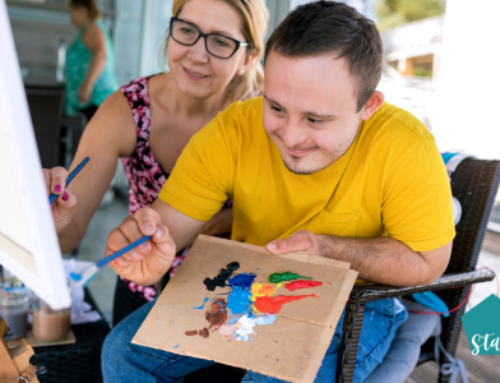At Home to Stay, we believe that all people can lead meaningful, productive lives as active participants in their communities. Our professional caregivers are committed to providing extraordinary, individualized care, allowing adults with disabilities the opportunity to grow and thrive in their environments. In this blog, we will discuss the critical role that caregivers play in supporting independence for adults with disabilities and provide valuable resources for caregivers.
Understanding the Needs of Adults with Developmental and Intellectual Disabilities
 There is a vast range of conditions that are considered developmental and intellectual disabilities, such as cerebral palsy, autism spectrum disorder, and Down syndrome. Individuals living with disabilities often experience issues with social, cognitive, and adaptive functioning, which can lead to trouble with communication, mobility, or daily living skills depending on the condition and its severity.
There is a vast range of conditions that are considered developmental and intellectual disabilities, such as cerebral palsy, autism spectrum disorder, and Down syndrome. Individuals living with disabilities often experience issues with social, cognitive, and adaptive functioning, which can lead to trouble with communication, mobility, or daily living skills depending on the condition and its severity.
In order to provide quality care to adults with developmental and intellectual disabilities, caregivers should recognize and respect the unique needs and abilities of each individual. This person-centered approach is the foundation of our services at Home to Stay.
The Crucial Role of Caregivers
The caregivers for adults living with disabilities assume a large range of responsibilities, including providing emotional support, facilitating skill development, advocating for the individual, and creating a nurturing and inclusive environment. These responsibilities are often much more demanding than the duties of basic personal caregiving.
Helping adults with developmental disabilities achieve a sense of confidence and self-esteem is another crucial part of their caregivers’ role. By being patient, providing encouragement, and understanding the individual’s needs, caregivers assist these adults in overcoming challenges and reaching their full potential.
Supporting Independence for Adults with Disabilities
The main goal for adults with disabilities is maintaining independence in their everyday lives, which improves their self-worth and quality of life. This requires a collaborative effort between the individual and their caregiver. Below are a few strategies that can be used to support independence:
- Individualized Care Plans – Customize care plans to meet the specific needs and goals of each individual.
- Setting Achievable Goals – Set realistic and attainable goals for skill development and daily living activities.
- Skill-Building Activities – Have them participate in activities and therapies that promote skill development and cognitive function.
- Creating Accessible Environments – Living spaces should be tailored to the individual’s needs, with necessary assistive devices and accessible facilities.
- Encouraging Self-Advocacy – Involve the individual in decision-making and teach them to communicate their needs and preferences.
Resources and Services for Caregivers
The demands of providing care for adults living with disabilities can be overwhelming. However, caregivers can find support through various resources:
- Caregiver Support Groups – These groups can offer a community of other caregivers in similar situations to share their experiences and challenges.
- Online Communities – Forums and communities on the internet provide caregivers a chance to connect, seek advice, and gain valuable knowledge.
- Training and Educational Programs – Training and workshops may be available for caregivers of adults with disabilities, giving them the skills and knowledge necessary for adequate caregiving.
Home to Stay Supports Adults Living with Disabilities
Through dedication, compassion, and a commitment to promoting independence, Home to Stay’s caregivers play a pivotal role in the lives of adults living with developmental and intellectual disabilities. Ultimately, we want to help our clients’ hopes and dreams become a reality.
“Home to Stay provides community inclusion and life enrichment for individuals living with developmental disabilities. We do this by not only listening to what’s important to them in order to make them feel useful but also by providing structure and programming that gives meaning in their daily lives.” – Andrew Dubler, co-owner Home to Stay
Are you looking to provide your loved one with disabilities a sense of independence? Look no further! Home to Stay is now an approved provider with the Division of Developmental Disabilities (DDD), allowing us to provide quality services to individuals with developmental and intellectual disabilities. Contact us today at (856) 321-1500 to see how we can help your loved one!







